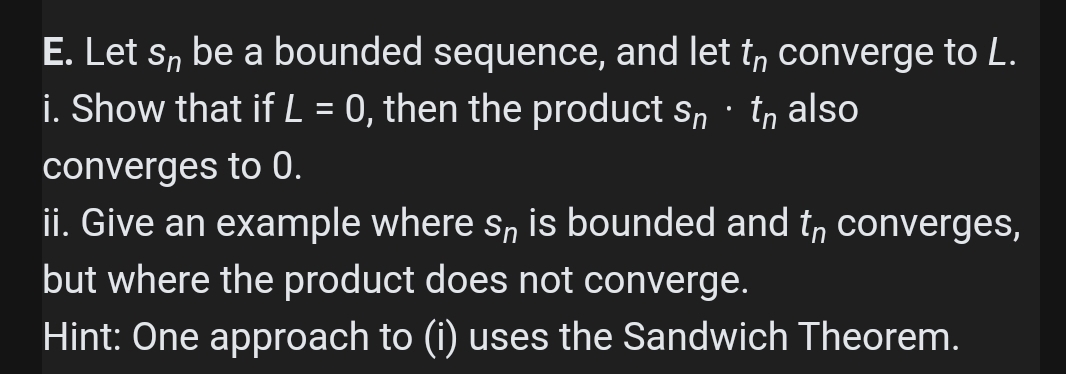E. Let s, be a bounded sequence, and let t, converge to L. i. Show that if L = 0, then the product s, · tn also converges to 0. ii. Give an example where s, is bounded and t, converges, but where the product does not converge. Hint: One approach to (i) uses the Sandwich Theorem.
E. Let s, be a bounded sequence, and let t, converge to L. i. Show that if L = 0, then the product s, · tn also converges to 0. ii. Give an example where s, is bounded and t, converges, but where the product does not converge. Hint: One approach to (i) uses the Sandwich Theorem.
Algebra & Trigonometry with Analytic Geometry
13th Edition
ISBN:9781133382119
Author:Swokowski
Publisher:Swokowski
Chapter10: Sequences, Series, And Probability
Section10.1: Infinite Sequences And Summation Notation
Problem 72E
Related questions
Question

Transcribed Image Text:E. Let s, be a bounded sequence, and let t, converge to L.
i. Show that if L = 0, then the product s, · tn also
converges to 0.
ii. Give an example where s, is bounded and t, converges,
but where the product does not converge.
Hint: One approach to (i) uses the Sandwich Theorem.
Expert Solution
This question has been solved!
Explore an expertly crafted, step-by-step solution for a thorough understanding of key concepts.
Step by step
Solved in 3 steps with 3 images

Recommended textbooks for you

Algebra & Trigonometry with Analytic Geometry
Algebra
ISBN:
9781133382119
Author:
Swokowski
Publisher:
Cengage

Algebra & Trigonometry with Analytic Geometry
Algebra
ISBN:
9781133382119
Author:
Swokowski
Publisher:
Cengage